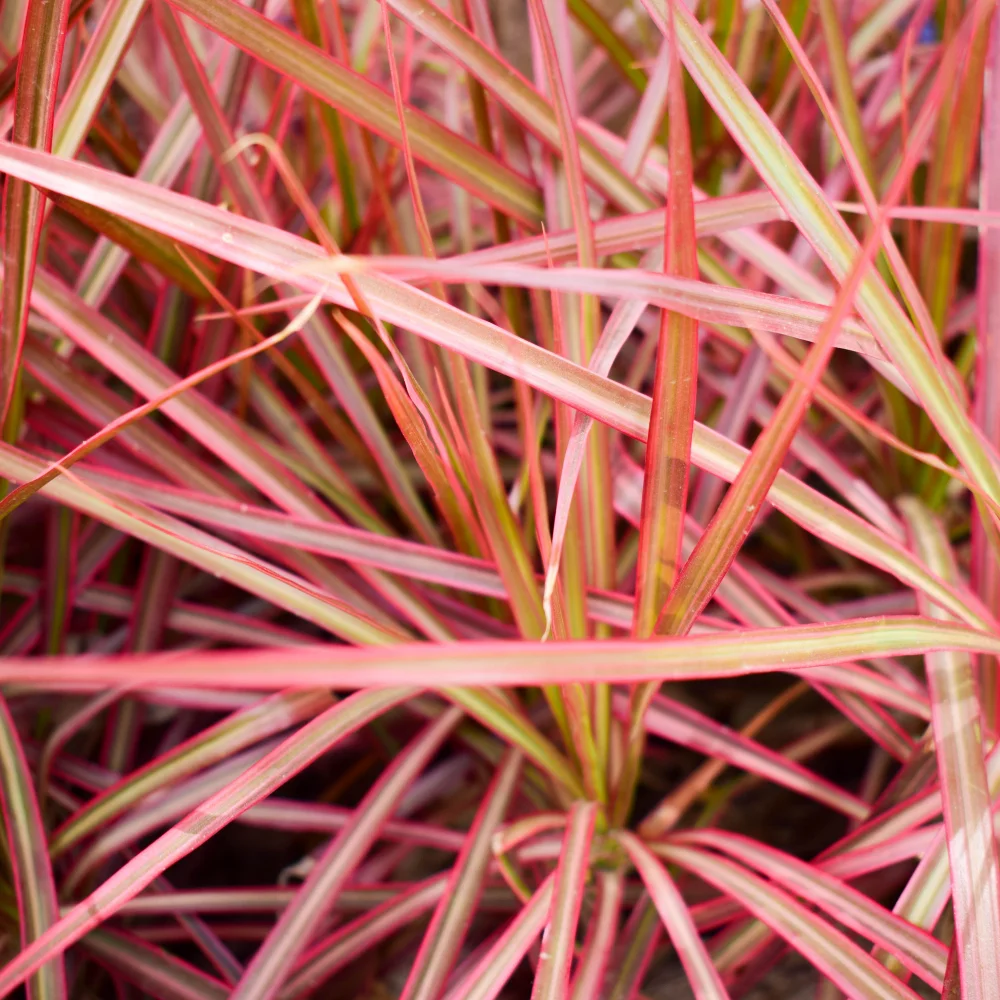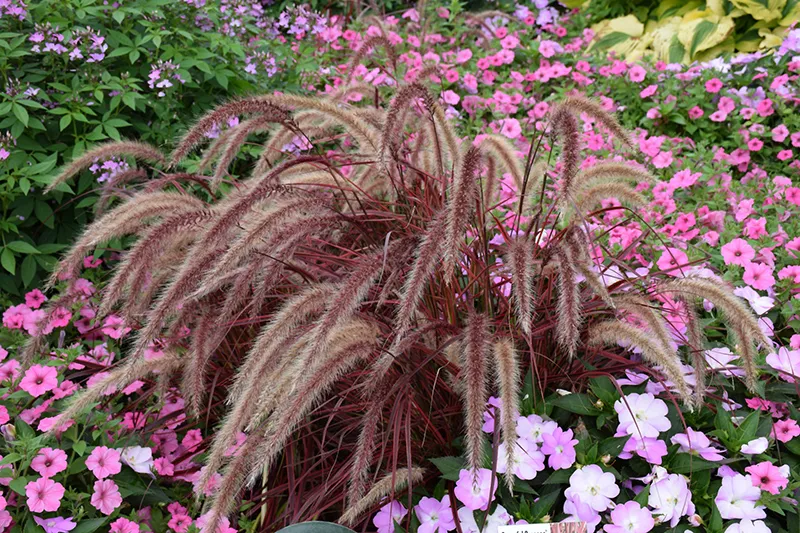Family: Fountain Grass
Type: Annual

Pennisetum setaceum ‘Fireworks’ is a stunning ornamental grass known for its vibrant, variegated foliage. This cultivar stands out with its striking shades of pink, burgundy, and green, resembling an explosion of color similar to fireworks.
This perennial grass is ideal for adding a bold color statement to gardens and landscapes. Its upright growth and arching form create a dramatic visual impact.
‘Fireworks’ is not only admired for its beauty but also for its adaptability and low maintenance requirements. It thrives in a variety of climates and soil types, making it a popular choice for gardeners seeking both aesthetics and ease of care.
Hardiness Zone: 9a-11b
Deer Resistant: Yes
Pet Friendly: Yes
Moisture Preference: Dry to moist
Sun Needs: Full sun
Drought Tolerance (Xeriscape): Yes
Growth Rate: Medium
Average Height (feet): 3
Average Spread (feet): 2
Average Life Span (years): 10
Form: Arching
Flower Color: Red
Secondary Flower Color: Tan
Bloom Season: From late summer to mid fall
Foliage Color: Red
Leaf Fall Color: Red
Foliage Shape: Grassy
Incorporating ‘Fireworks’ into your landscape brings an instant pop of color. Its vivid foliage makes it a standout feature in any garden setting.
This grass is perfect for creating eye-catching borders, adding height to flower beds, or as a stunning centerpiece in a garden composition. Its colorful foliage provides a striking contrast against green plants and garden elements.
Use ‘Fireworks’ in clusters for a dramatic effect, or as an accent plant among more subdued foliage. Its unique coloring and form create visual interest throughout the year.

In a tropical garden, 'Fireworks' adds a burst of color among lush greenery. Its vibrant hues complement the exotic feel of tropical landscapes.
For contemporary gardens, 'Fireworks' offers a modern, artistic touch. Its bold colors and form fit well in minimalist designs, providing a focal point of interest.
In Mediterranean-style gardens, this grass adds flair with its drought tolerance and vibrant colors. It blends well with the earthy tones and textures typical of Mediterranean landscapes.
Plant ‘Fireworks’ along walkways or garden paths to create a lively border. Its tall, arching leaves will sway gracefully, adding movement to the landscape.
Pair it with succulents or other drought-tolerant plants for a vibrant, low-water garden. The contrast of its colorful foliage against the muted tones of succulents is striking.
In container gardens, ‘Fireworks’ makes a bold statement. Its upright growth is ideal for adding vertical interest to patios and balconies.
Select our pre-made garden layouts to create a landscape that’s uniquely yours. Simple, smart, and customizable!
In spring, 'Fireworks' begins to show its vibrant foliage. Fresh, bright leaves emerge, setting the stage for the colorful display to follow.
During summer, this grass is in its full glory. The plant is covered in its signature vibrant leaves, creating a stunning and colorful display in the garden.
As fall approaches, the colors of 'Fireworks' may deepen. The cooler temperatures can intensify the hues, adding to the autumnal beauty of the garden.
In winter, 'Fireworks' may go dormant, especially in colder climates. While the plant may not retain its vibrant colors, proper care ensures it will return with vigor in the spring. In milder climates, it may retain some of its colorful foliage.
Sedum spectabile 'Autumn Joy'
Buddleia davidii 'Black Knight'
Perovskia atriplicifolia 'Little Spire'
Pennisetum setaceum ‘Fireworks’ should be planted in an area with full sun to achieve its best color. It’s ideal for open spaces in gardens, along borders, or in large containers.
This grass requires full sun to maintain its vibrant coloration. At least 6 hours of direct sunlight daily is recommended for optimal growth.
'Fireworks' is adaptable to a variety of soil types but prefers well-drained soil. It can tolerate a range of soil conditions, from clay to sandy soils.
Space plants about 18-24 inches apart. This spacing allows each plant enough room for growth and ensures good air circulation, essential for plant health.
The best time to plant ‘Fireworks’ is in the spring, after the last frost has passed. This timing allows the plant to establish itself during the growing season.
Dig a hole as deep and twice as wide as the root ball. Place the grass in the hole, fill it with soil, and water thoroughly to establish a good root system.
Regular watering is essential during the first growing season to establish a deep, extensive root system. Once established, ‘Fireworks’ is relatively drought-tolerant.
Apply a balanced, slow-release fertilizer in the spring to promote healthy growth. Avoid over-fertilization to prevent excessive growth at the expense of color.
Prune back the grass in late winter or early spring before new growth starts. This helps maintain its shape and encourages fresh, vibrant growth.
Remove any dead foliage and apply a light fertilizer as new growth appears. Begin regular watering to encourage vibrant foliage development.
Water the grass during prolonged dry periods in the summer. Otherwise, minimal care is needed during this vibrant growing season.
Reduce watering as the plant begins to go dormant. Prepare 'Fireworks' for winter by cutting back on care and monitoring for pests.
In winter, 'Fireworks' may require little care, especially in milder climates. In colder regions, protect the root zone with mulch if the grass is left outdoors.
Pennisetum alopecuroides 'Hameln'
Miscanthus sinensis Gracillimus
Pennisetum alopecuroides 'Little Bunny'
‘Fireworks’ typically reaches about 2 to 3 feet in height and width, making it a striking yet manageable size for most gardens.
In some regions, Pennisetum setaceum can be considered invasive. It’s important to check local guidelines and manage the plant to prevent unwanted spread.
Yes, ‘Fireworks’ can be successfully grown in containers. Its vibrant foliage makes it an excellent choice for adding color and interest to patios and balconies.
Sign up below to get exclusive deals, discounts, and new plant collections—delivered straight to your inbox! Plus, stay inspired with the latest gardening tips, landscaping trends, and DIY garden ideas. Start growing with us today!
A big thank you for subscribing to the PBN Design newsletter.
We're thrilled to have you join our community. Get ready for exciting updates, insightful content, and more delivered straight to your inbox.
Stay tuned!
Go backA big thank you for subscribing to the PBN Design newsletter.
We're thrilled to have you join our community. Get ready for exciting updates, insightful content, and more delivered straight to your inbox.
Stay tuned!
Go back